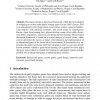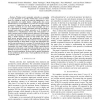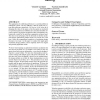183 search results - page 18 / 37 » Learning Social Preferences in Games |
124
click to vote
TEDU
2008
15 years 1 months ago
2008
This paper presents a theoretical framework, which has been adopted in designing an on-line multi-player strategy game Europe 2045. Europe 2045 is an educational tool for high scho...
124
click to vote
INFOCOM
2008
IEEE
15 years 8 months ago
2008
IEEE
—Wireless social community networks are emerging as a new alternative to provide wireless data access in urban areas. By relying on users in the network deployment, a wireless co...
113
click to vote
CORR
2008
Springer
15 years 2 months ago
2008
Springer
Motivated by applications in social networks, peer-to-peer and overlay networks, we define and study the Bounded Budget Connection (BBC) game - we have a collection of n players o...
121
click to vote
ACMICEC
2003
ACM
15 years 7 months ago
2003
ACM
The aggregation of conflicting preferences is a central problem in multiagent systems. The key difficulty is that the agents may report their preferences insincerely. Mechanism ...
133
click to vote
ATAL
2006
Springer
15 years 5 months ago
2006
Springer
In many Multi-Agent Systems (MAS), agents (even if selfinterested) need to cooperate in order to maximize their own utilities. Most of the multi-agent learning algorithms focus on...



